|
|
|
Sort Order |
|
|
|
Items / Page
|
|
|
|
|
|
|
| Srl | Item |
| 1 |
ID:
156092
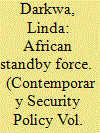

|
|
|
|
|
| Summary/Abstract |
Declared operationally ready in 2016, the African Standby Force (ASF) has not been deployed in its originally designed form. This is not for the lack of opportunities but rather a demonstration of the power of the Regional Economic Communities/Regional Mechanisms (RECs/RMs) – Africa’s sub-regional security structures – over matters of peace and security. Experience gathered from its short existence suggests that the ASF may never be deployed in its current form. It may instead evolve into a robust framework, adaptable mainly by the RECs/RMs, for addressing varied security challenges. Four things are critical to enhancing the utility of the ASF: the political willingness of the RECs/RMs, the strategic interest of the member states, predictable and sustainable financing, and clarity on the role of the African Capability for Immediate Response to Crisis, the temporary battlegroup that was created to provide the African Union with a rapid response capability, pending the ASF’s operationalization.
|
|
|
|
|
|
|
|
|
|
|
|
|
|
|
|
| 2 |
ID:
191213


|
|
|
|
|
| Summary/Abstract |
Energy research seeking to influence policy in low- and middle-income countries (LMICs) is often funded by – and conceptualised by authors in – institutions from higher income countries (HICs). Research agendas and policy recommendations determined in HICs potentially yield the most influence on policymaking in LMICs. This risks leaving a multidimensional gap in how LMICs frame, evidence and enact policies. This paper is the first to provide quantitative evidence to geographical imbalances in energy policy research, and to shed light into the fact that research proposing energy policy coupled with development objectives to LMICs is dominated by HICs researchers. We find that the latter not only publish more articles proposing energy policy to LMICs, but also are more cited when doing so. We reach these findings by analysing the spatial dynamics of energy research on LMICs through a multi-method approach using bibliometric, network science and regression-based techniques. We established a framework using a sample of 6,636 papers from the Web of Science database, journal impact data from Scimago Journal Ranking and country economic data from the World Bank. Results show the existence of a cycle of imbalances across research practices. Most scientific articles recommending energy policy for LMICs have a primary author based in a HIC, funded by a HIC institution. The number of citations articles receive increases with the GDP of the country of primary author. Funders support authors based in countries of the same income band or higher. We recommend revising research practices and funding policies to place local actors and knowledge at the heart of energy policy research, enabling high-impact policymaking in LMICs.
|
|
|
|
|
|
|
|
|
|
|
|
|
|
|
|
| 3 |
ID:
100948
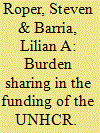

|
|
|
|
|
| Publication |
2010.
|
| Summary/Abstract |
The authors apply the theory of collective action and alliance behavior first developed by Olson and Zeckhauser and later extended by Sandler in a series of studies to test whether the nature of refugee protection influences state motivations to provide contributions. The authors investigate whether refugee protection can be viewed as a pure public good with the concomitant problem of free riding leading to suboptimal outcomes or whether contributions provide states private benefits that transform the nature of the good. Using a Heckman selection model, they test for the determinants of state contributions to the United Nations High Commissioner for Refugees and find that refugee protection offers several private benefits, indicating that it is best understood as an impure public good. They conclude, however, that even when states are able to secure these private benefits, it does not necessarily lead to the optimal provision of refugee protection.
|
|
|
|
|
|
|
|
|
|
|
|
|
|
|
|
| 4 |
ID:
101757


|
|
|
| 5 |
ID:
090933


|
|
|
|
|
| Publication |
2009.
|
| Summary/Abstract |
I show herein how to develop fundable proposals to support your research. Although the proposal strategy I discuss is commonly used in successful proposals, most junior faculty (and many senior scholars) in political science and other social sciences seem to be unaware of it. I dispel myths about funding, and discuss how to find funders and target funding programs. I then outline how to write a proposal; and detail how to respond to reviews.
|
|
|
|
|
|
|
|
|
|
|
|
|
|
|
|
| 6 |
ID:
152589
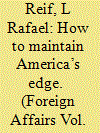

|
|
|
|
|
| Summary/Abstract |
In February 2016, scientists from the Massachusetts Institute of Technology (MIT) and the California Institute of Technology, or Caltech, joined with the National Science Foundation (NSF) to share some remarkable news: two black holes 1.3 billion light-years away had collided, and the resulting gravitational waves had been “heard” by the twin detectors of the Laser Interferometer Gravitational-Wave Observatory (LIGO). This was the first time such waves—ripples in the space-time continuum caused by the violent acceleration of massive objects—had ever been directly observed. Albert Einstein had predicted such waves a century ago, but it was long doubted that instrumentation sensitive enough to confirm their existence could ever be created. It took more than four decades of work by a vast team of scientists to make the impossible possible.
|
|
|
|
|
|
|
|
|
|
|
|
|
|
|
|
| 7 |
ID:
087389


|
|
|
|
|
| Publication |
2009.
|
| Summary/Abstract |
The insurrection in Pakistan's tribal areas has been unexpectedly robust, lethal, and resilient, which has surprised many in Pakistan and the Western world. The focus of the violence emanating from this region is not confined to Afghanistan or Pakistan alone, but spans the entire world, especially Europe and North America. A number of external actors like Al Qaeda and its associates are exploiting the prevailing lawlessness in Federally Administered Tribal Areas (FATA) for sanctuary and a base for their logistical, training, and operational purposes, while the local Taliban reap rich financial rewards in the mayhem.
|
|
|
|
|
|
|
|
|
|
|
|
|
|
|
|
| 8 |
ID:
122304
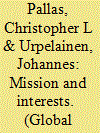

|
|
|
|
|
| Publication |
2013.
|
| Summary/Abstract |
International advocacy campaigns allow the concerns of disadvantaged groups in developing countries to reach policymakers. However, recent research has challenged the motivations of the Northern nongovernmental organizations involved and raised concerns about the impacts of North-South NGO partnerships on Southern NGO control. This article addresses these concerns by developing a typology of NGOs based on their financial incentives and the rigidity with which they adhere to their established organizational mission. It then models interactions between NGOs of different types as a strategic game. In the game, NGOs decide whether to enter international campaigns and, if so, manage campaign function to maximize payoff. "Participation-oriented" Northern NGOs, whose supporters reward them for undertaking advocacy, were found to run lengthy but ineffective campaigns and focus on publicity. "Outcome-oriented" groups, whose supporters reward them for measurable achievement, were found to generate higher campaign intensity but exit after either early victories or costly difficulties. The model is illustrated with a comparative analysis of two different campaigns regarding the Narmada Dam project.
|
|
|
|
|
|
|
|
|
|
|
|
|
|
|
|
| 9 |
ID:
103649
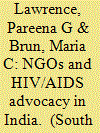

|
|
|
|
|
| Publication |
2011.
|
| Summary/Abstract |
India has the second-largest population living with HIV/AIDS in the world. Although the exact number of HIV positive people is contested, it is predicted that the current numbers are likely to grow at a rapid rate in the next decade if the epidemic goes unchecked. This paper explores the HIV/AIDS epidemic in India through the perspective of two non-governmental organisations (NGOs) whose roles have become critical in the fight against the disease. Specifically, it identifies the challenges faced by these NGOs such as lack of government responsiveness, funding-related problems, corruption, donor accountability, and cultural attitudes to HIV/AIDS, while exploring the theoretical implications of NGOs playing a greater role in providing programming and services to those living with, and affected by, the epidemic.
|
|
|
|
|
|
|
|
|
|
|
|
|
|
|
|
| 10 |
ID:
123862
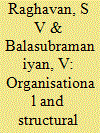

|
|
|
| 11 |
ID:
126351
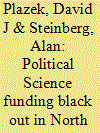

|
|
|
|
|
| Publication |
2013.
|
| Summary/Abstract |
Recent actions in Congress that threaten political science funding by the National Science Foundation (NSF) have caught the attention of political scientists, but this was not the first attack and not likely to be the last. Less than one year ago, the Harper government ended the Understanding Canada program, an important source of funding for academics in the United States and abroad. This article stresses the value of the program and the importance of this funding steam by demonstrating what the grants have done both more generally as well as for the authors individually. In addition, by looking at the political process that led to the end of the Understanding Canada program and the similarities in the attacks on NSF political science funding, this article identifies potential reasons why these funds were and are at risk. We conclude by arguing that normative action in support of political science is a necessity for all political scientists.
|
|
|
|
|
|
|
|
|
|
|
|
|
|
|
|
| 12 |
ID:
133309
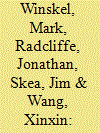

|
|
|
|
|
| Publication |
2014.
|
| Summary/Abstract |
The UK energy technology innovation system (ETIS) has undergone wholesale remaking in recent years, in terms of its aims, funding and organisation. We analyse this process and distinguish between three phases since 2000: new beginnings, momentum building and urgency and review. Within an international trend to ETIS rebuilding, UK experience has been distinctive: from a low starting base in the early-2000s, to system remaking under a strong decarbonisation policy imperative in the late-2000s, to multiple and contested drivers in the early-2010s. Public funding levels have been erratic, with a rapid increase and a more recent decline. The private business sector has played a leading role in this remaking, and as this influence has grown, the role and style of energy innovation has shifted from long term niches to the shorter term mainstream. The UK ETIS suffers from persistent problems: fragmentation, low transparency and weak links to the research evidence base.
|
|
|
|
|
|
|
|
|
|
|
|
|
|
|
|
| 13 |
ID:
087770


|
|
|
|
|
| Publication |
2009.
|
| Summary/Abstract |
Existing typological frameworks do not adequately categorize terrorist groups by their operational characteristics. We propose a new framework which compares terrorist groups to business firms. In our framework, terrorist groups are mapped on two axes: centralization of resources and centralization of operations. We separate terrorist groups into four typologies echoing familiar business arrangements: Hierarchy, Venture Capital, Franchise, and Brand. Responses to each typology are briefly sketched out. We conclude by analyzing the changes in Al Qaeda over the last two decades in the context of our framework. We close by proposing appropriate policy responses to combat Al Qaeda in light of its current Brand typology.
|
|
|
|
|
|
|
|
|
|
|
|
|
|
|
|
| 14 |
ID:
106615


|
|
|
|
|
| Publication |
2011.
|
| Summary/Abstract |
This article explores the consequences for the funding of Islamist terrorist groups of nationalization, in the form of state sponsorship, versus privatization, in the form of autonomous financing. The article begins by examining the evolution in terrorist groups' sources of funding from state sponsorship to autonomous activity, then turns to the benefits and costs to terrorist groups of relying on state sponsors. The article then analyzes the benefits and costs of procuring funding autonomously. Finally, the article weighs those benefits and costs in relation to a terrorist group's emphasis on enhancing its constituency versus pursuing its agenda. The article's central conclusion is that nationalization tends to boost a terrorist group's constituency while privatization tends to bolster a group's agenda. Determining which advantage takes priority depends on the relative importance to a given terrorist group at a particular time of enhancing its constituency versus advancing its agenda.
|
|
|
|
|
|
|
|
|
|
|
|
|
|
|
|
|
|
|
|
|